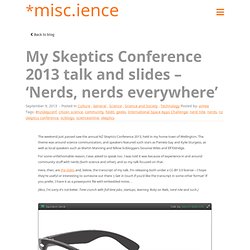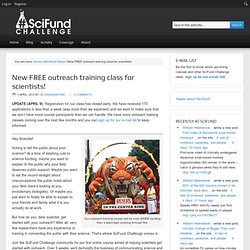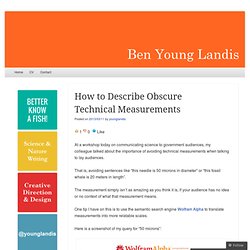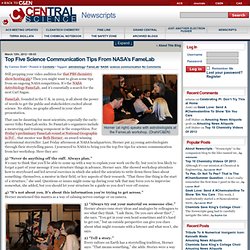

– My Skeptics Conference 2013 talk and slides – ‘Nerds, nerds everywhere’ The weekend just passed saw the annual NZ Skeptics Conference 2013, held in my home town of Wellington.

The theme was around science communication, and speakers featured such stars as Pamela Gay and Kylie Sturgess, as well as local speakers such as Martin Manning and fellow Scibloggers Siouxise Wiles and Elf Eldridge. For some unfathomable reason, I was asked to speak too. I was told it was because of experience in and around community stuff with nerds (both science and other), and so my talk focused on that. Here, then, are the slides and, below, the transcript of my talk. I’m releasing both under a CC-BY 3.0 license – I hope they’re useful or interesting to someone out there :) Get in touch if you’d like the transcript in some other format!
[Also, I'm sorry it's not better. Hi everyone :) I’m aimee. I hope you’ve had a great time so far! Forming communities around interests and beliefs is pretty common behaviour amongst people. Why do I want to do this? Senior Media Advisor Job in Wellington. New FREE outreach training class for scientists! UPDATE (APRIL 9): Registration for our class has closed early.

We have received 170 applications in less than a week (way more than we expected) and we want to make sure that we don’t have more course participants than we can handle. We have more outreach training classes coming over the next few months and you can sign up for our e-mail list to keep informed. Our outreach training course will be even MORE exciting than a giant tiger jumping through fire. Hey Scientist! Itching to tell the public about your science?
But how do you, dear scientist, get started with your outreach? Join the SciFund Challenge community for our first online course aimed at helping scientists get started with outreach. Cost: FREE. When: April 29-May 31, 2013 (five weeks) Where: The Internet! Who: Active scientists in any country in any discipline at any level (from graduate student to emeritus professor to government scientist to NGO scientist). What course participants will gain from the course: Four Ways to Open a Science Story. Specials : Nature. How to Describe Obscure Technical Measurements. At a workshop today on communicating science to government audiences, my colleague talked about the importance of avoiding technical measurements when talking to lay audiences.

That is, avoiding sentences like “this needle is 50 microns in diameter” or “this fossil whale is 20 meters in length”. The measurement simply isn’t as amazing as you think it is, if your audience has no idea or no context of what that measurement means. One tip I have on this is to use the semantic search engine Wolfram Alpha to translate measurements into more relatable scales. Here is a screenshot of my query for “50 microns”: So, instead of or in addition to mentioning “50 microns”, you can say that it’s about “half the thickness of a dollar bill” or “half the thickness of a strand of human hair”. – Ben Young Landis. RSA Animate. Marketing for Scientists. Top Five Science Communication Tips From NASA’s FameLab. March 12th, 2012 • 09:03 Horner (at right) speaks with astrobiologists at the FameLab workshop.

(Drahl/C&EN) Still prepping your video audition for that PBS chemistry show hosting gig? Then you might want to glean some tips from an ongoing NASA competition. It’s the NASA Astrobiology FameLab, and it’s essentially a search for the next Carl Sagan. FameLab, founded in the U.K. in 2005, is all about the power of words to get the public and stakeholders excited about science. That can be daunting for most scientists, especially the early-career folks FameLab seeks. 5) “Never do anything off the cuff. 4) “It’s not about you. Early-career astrobiologists listen to Horner at the FameLab workshop. 3) “Always try out your material on someone else.” 2) “Tell a story.” I livetweeted the competition at National Geographic on Friday night.